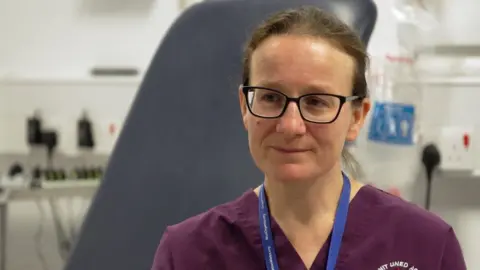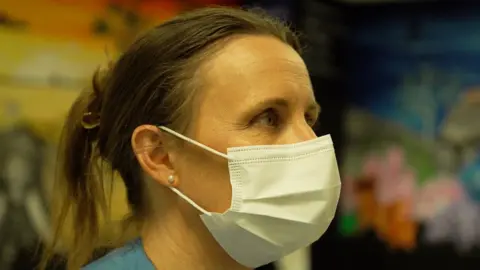Coronavirus: People told to phone ahead before going to A&E
People with non-life threatening illnesses will be told to call before going to Wales' biggest A&E department.
Patients will be assessed remotely and given a time slot for the University Hospital of Wales in Cardiff if needed.
Hospital bosses feel returning to over-crowded waiting rooms would provide an "unacceptable" risk to patients due to coronavirus.
The system is set to start at the end of July, but will not apply to people with serious illnesses or injuries.
There will be no change to how 999 calls are dealt with.
When cases of Covid-19 began to emerge in Wales, the A&E department had to expand into adjoining departments, mainly because it had to be split into two parts.
One was for the care of patients with suspected Covid-19 - with staff working in full personal protective equipment - the other was for patients judged to be at low risk of having the virus.
While the number of those turning up at the department with non-urgent needs dropped at the height of the crisis, they have increased again.
That has prompted concerns waiting rooms in the non-coronavirus areas are becoming too full, with patients unable to social distance.

Before the pandemic, as many as 120 people could be in A&E at peak times, with standing room only in waiting rooms.
"A year ago, pre-covid, on a Saturday night, our emergency unit would be crowded with patients with lots of different problems," said the department's lead-doctor Dr Katja Empson.
"We recognise that's not a good model of care for an emergency service at the best of times.
"But specifically now - with covid endemic in our population and the risk that one of those people in the waiting area has indeed got covid and isn't aware of it - the risk of transmitting that infection, potentially to other vulnerable patients within that, is unacceptable."
Despite Covid-19 parts of the A&E being quieter now, the department still needs to be divided because the virus is still circulating and in case there is a second wave.
Non Smith, an A&E nurse at the hospital, said: "We have to maintain them both at the same time - maintain the same standards of safety for patients."
How would the system work?
Details are still being discussed by Cardiff and Vale health board, but patients with less serious illnesses or injuries will be told to phone ahead, most likely on the 24-hour number used to contact the local GP out-of-hours service.
They will be assessed by a doctor or a nurse and, depending on the severity of the condition, will either be given a time window to go to A&E or be directed to other services.
People who just turn up at the department will also be told they need to use the phone service.
This system was introduced in Denmark several years ago.
"We're looking to have a number of appointments available throughout a 24-hour period, where people can come at a time when they'd expect to be seen," said Dr Empson.
"In that way, they can safely isolate at home and wait in the comfort of their own home and access the emergency unit when we know that there's capacity for us to receive them."
Work is taking place to reduce the risks to people who are homeless, have drug or alcohol problems or who cannot speak English and might struggle with the new system.
"We're aware that the emergency unit has always been a place for certain vulnerable groups to access healthcare," Dr Empson said.

"This is all about being safe and ensuring that emergency medicine and emergency care is safe and not about putting barriers in place to those more vulnerable people.
"What we really think is that by using this system, we'll be able to focus our attention on those vulnerable groups when they do present."
If successful, the system could become a long-term answer to reducing pressures on emergency medicine, she added.
As an example, the health board analysed data from people who went to A&E on 18 November 2019.
It said 311 of the 515 patients seen could have rung ahead and appointments would have been given to 202 people, meaning 109 patients could have avoided going to A&E by being given advice on how to treat themselves or being seen elsewhere.
The Royal College of Emergency Medicine has been urging the NHS to redesign A&E departments in the wake of the Covid-19 crisis.
Last week, the chief executive of the NHS in Wales said health boards across the country were considering new approaches.
